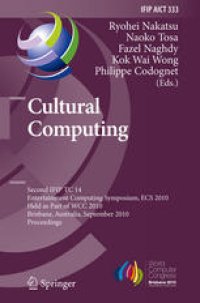
Ebook: Cultural Computing: Second IFIP TC 14 Entertainment Computing Symposium, ECS 2010, Held as Part of WCC 2010, Brisbane, Australia, September 20-23, 2010. Proceedings
Author: Andrew Chiou (auth.) Ryohei Nakatsu Naoko Tosa Fazel Naghdy Kok Wai Wong Philippe Codognet (eds.)
- Tags: User Interfaces and Human Computer Interaction, Information Systems Applications (incl.Internet), Computer Graphics, Multimedia Information Systems, Image Processing and Computer Vision, Media Design
- Series: IFIP Advances in Information and Communication Technology 333
- Year: 2010
- Publisher: Springer-Verlag Berlin Heidelberg
- Edition: 1
- Language: English
- pdf
Welcome to the Second International IFIP Entertainment Computing Symposium on st Cultural Computing (ECS 2010), which was part of the 21 IFIP World Computer Congress, held in Brisbane, Australia during September 21–23, 2010. On behalf of the people who made this conference happen, we wish to welcome you to this inter- tional event. The IFIP World Computer Congress has offered an opportunity for researchers and practitioners to present their findings and research results in several prominent areas of computer science and engineering. In the last World Computer Congress, WCC 2008, held in Milan, Italy in September 2008, IFIP launched a new initiative focused on all the relevant issues concerning computing and entertainment. As a - sult, the two-day technical program of the First Entertainment Computing Symposium (ECS 2008) provided a forum to address, explore and exchange information on the state of the art of computer-based entertainment and allied technologies, their design and use, and their impact on society. Based on the success of ECS 2008, at this Second IFIP Entertainment Computing Symposium (ECS 2010), our challenge was to focus on a new area in entertainment computing: cultural computing.
This book constitutes the refereed proceedings of the Second IFIP TC 14 Entertainment Computing Symposium, ECS 2010, held as part of the 21st World Computer Congress, WCC 2010, in Brisbane, Australia, in September 2010. The 23 revised full papers presented together with one invited paper were carefully reviewed and selected from numerous submissions. The papers address substantial cultural issues such as sensitivity, memory, spirituality, storytelling, racial characteristics etc. that have not been treated in computer science and engineering so far. The topics range from preservation of cultural heritage and traditional technologies using computers, treating models and types in cultural contents to cultural education using computers.